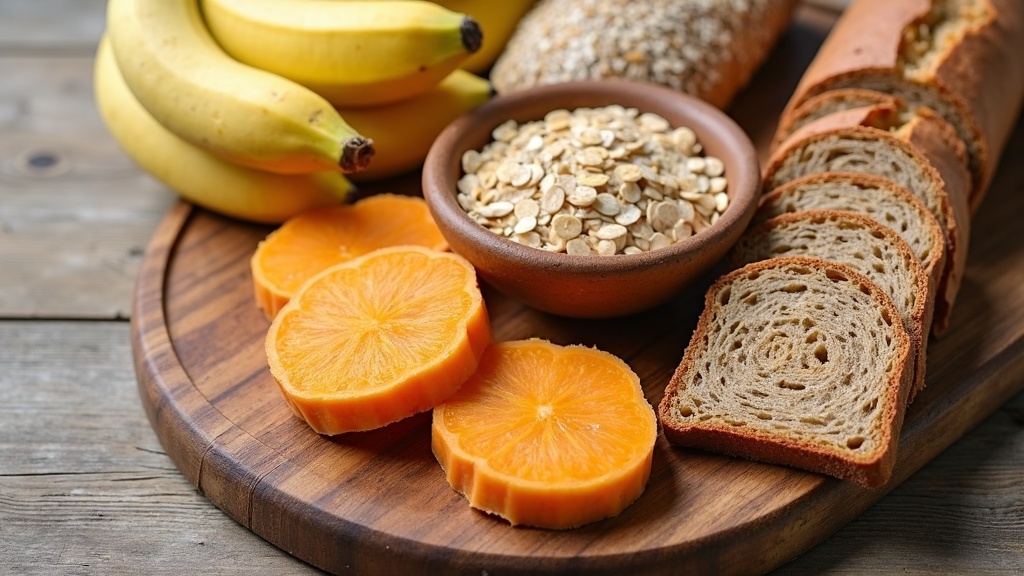
Carbohydrates: The Basics and Why They Matter for Runners
Carbohydrates are one of the three main macronutrients, alongside protein and fat. In really simple terms, carbs are the body’s go-to source for quick and efficient energy. When you eat foods like bread, rice, pasta, fruits, or even some veggies, your body breaks down the carbohydrates into glucose (a type of sugar), which then gets stored as glycogen in your muscles and liver. When you’re out running or doing other aerobic activities, your muscles dip into these stored glycogen supplies for energy.
Running, especially for longer distances, leans pretty heavily on having enough glycogen in the tank. When those supplies run low, you’re far more likely to “hit the wall,” meaning your pace drops and it gets tough just to keep moving. That’s why having enough carbs in your system is really important for any runner who wants steady energy and a solid performance.
Types of Carbohydrates and What They Do
Carbohydrates come in a couple of main flavors: simple and complex. Simple carbs are the really fast digesting ones you’ll find in things like fruit, honey, some dairy, and sugary snacks. These give a quick bump in energy, which is sometimes helpful right before a run or in the middle of a long-distance race.
Complex carbohydrates are starchier and digest a bit slower. You’ll find these in whole grains, oats, brown rice, potatoes, beans, and similar foods. Because they provide a more steady supply of energy, complex carbs work nicely as a backbone for meals before a workout or race. They also help keep you feeling fuller longer, which is helpful for anyone watching portion sizes or overall calories.
How Carbohydrates Impact Running Performance
For most runners, the connection between carbs and performance shows up in endurance and recovery. Here’s how it works:
- Energy for Muscles: Glycogen stored from carbs is basically what keeps your legs moving. Depleted glycogen means tired muscles and slower paces.
- Faster Recovery: Refueling with carbs after a run helps replenish those glycogen stores, so you can bounce back stronger for your next workout.
- Supports Intensity: If you’re doing intervals, hills, or tempo work, having carbs in your system helps you perform at a higher intensity for longer periods.
- Prevents “Bonking”: When glycogen gets super low, energy tanks, coordination suffers, and it can be tough to even finish. Carbs help you avoid this kind of total wipeout.
I’ve noticed personally that on days where I skimp on carbohydrates, my long runs feel way more challenging, and my stamina drops off much faster. On the flipside, a night before pasta dinner and a light carb focused breakfast have helped me cruise through races with steadier energy.
Planning Your Carbohydrate Intake as a Runner
If you’re new to tailoring your nutrition, the idea of “carb loading” might sound a little intimidating or complicated. But really, most runners can optimize their carb intake with a few simple adjustments, matched to training and racing needs.
- For everyday runs (up to 60 minutes): Regular meals with a mix of carbs, protein, and healthy fats will keep you covered. No need for anything special.
- For long runs or races (90+ minutes): Carb rich meals the day before and a snack 1–2 hours before you head out can help top off glycogen stores. During the run, runners often benefit from taking in quick carbs, like gels, chews, or sports drinks, every 45 minutes or so.
- After your run: Refueling with a meal or snack high in carbs and some protein within an hour is a good way to speed up recovery and reduce next-day soreness.
It’s worth trying different foods and timing to see what sits best in your stomach and fuels you most comfortably. Everyone’s digestive system is a bit different, and it can take some experimenting to find your favorites.
Common Carbohydrate Myths and Mistakes
There’s a lot of noise around low carb diets or demonizing certain carbs for anyone trying to “eat clean.” But for endurance athletes like runners, carbs aren’t the enemy; they’re a huge asset. Here are a few common myths that come up:
- “Carbs make you gain weight.” The real culprit in weight gain is overall calorie surplus, not carbs alone. When you’re running regularly, your body uses carbs for fuel, so they’re unlikely to be stored as fat unless you go way overboard.
- “All carbs are the same.” Processed sugars and whole grains act differently in the body. Focusing on whole, minimally processed carbs most of the time helps with energy and overall health.
- “Low carb improves endurance.” Research generally shows that runners perform better with adequate carbohydrates, especially for anything longer than a short sprint.
I tried dropping my carb intake once, and my workouts instantly felt tougher. Going back to a moderate high carb approach, especially before long days or races, has always boosted my running and recovery.
Choosing Carbohydrate Rich Foods for Optimal Running Performance
There are loads of good sources of carbs. Some are better suited for quick energy, others for lasting fuel or recovery. My go to picks include:
- Bananas, apples, and berries for snacks
- Oatmeal or wholegrain cereal with breakfast
- Wholegrain breads, brown rice, and pasta for meals
- Sweet potatoes for dinners or post run bowls
- Low-fat dairy or yogurt with fruit for a recovery snack
- If you’re on the go, energy bars with mostly simple ingredients work too
It’s fine to enjoy the occasional sweeter treat or refined carbs, especially during long runs when you need quick energy. For daily fueling, though, whole or minimally processed carbs usually help you feel and race your best.
Whether you’re new to running or chasing down a marathon PR, the right balance of carbohydrates can seriously improve your running experience. By understanding what carbs do for your body, experimenting with types and timing, and adjusting based on how you feel, you’ll be better fueled, and probably a lot happier, out on the road, trail, or track.
Carbohydrates and Runners: Frequently Asked Questions
Here are some straightforward answers to the most common questions I hear about carbs and running.
Do carbohydrates help with running?
Absolutely. Carbs are a quick and efficient fuel for your muscles, especially during moderate to high intensity runs. Keeping your glycogen stores topped up translates directly into better sustained energy, improved stamina, and an overall smoother running experience.
How do carbohydrates affect athletic performance?
Without enough carbs, your muscles run out of fuel, and your pace drops. Plus, the risk of fatigue and slower recovery goes way up when glycogen is low. Eating carbs around your workouts, before, during, or after, helps improve overall athletic performance and can help you hit training targets more consistently.
What is the relationship between carbohydrates and performance?
Carbohydrates serve as the main energy source for longer or harder workouts. When they’re available, you can push harder, keep going longer, and recover faster. It’s a direct relationship: more carb availability means better endurance and short-term performance.
How many carbs should I eat a day as a runner?
Recommendations can vary based on your size, training intensity, and goals, but most active runners do well with about 5 to 7 grams of carbs per kilogram of body weight per day when training regularly. For marathon training or really intense periods, some people even go up to 10g/kg. For example, a 150 pound runner (about 68kg) might aim for 340 to 480 grams of carbs daily during heavy training cycles. If you’re only running lightly or a few days a week, you may not need quite so many. Tailoring this to your needs and listening to your body is key.
BONUS
Another great “tool” that will help your body adjust perfectly to the desirable intensity of your workouts are Electrolytes. Have you ever heard about them? Maybe you have, but don’t know what they are. Well, I used to not know about them as well. But once I discovered how they could help me achieve my goals faster I immediately implemented them in my nutrition. You can do learn about them as well here. Make sure to stick to your plan, because all of this could easily go to waste if not. If you have any questions at all, make sure to reach out! I will be more than happy to help you out.

Leave a Reply